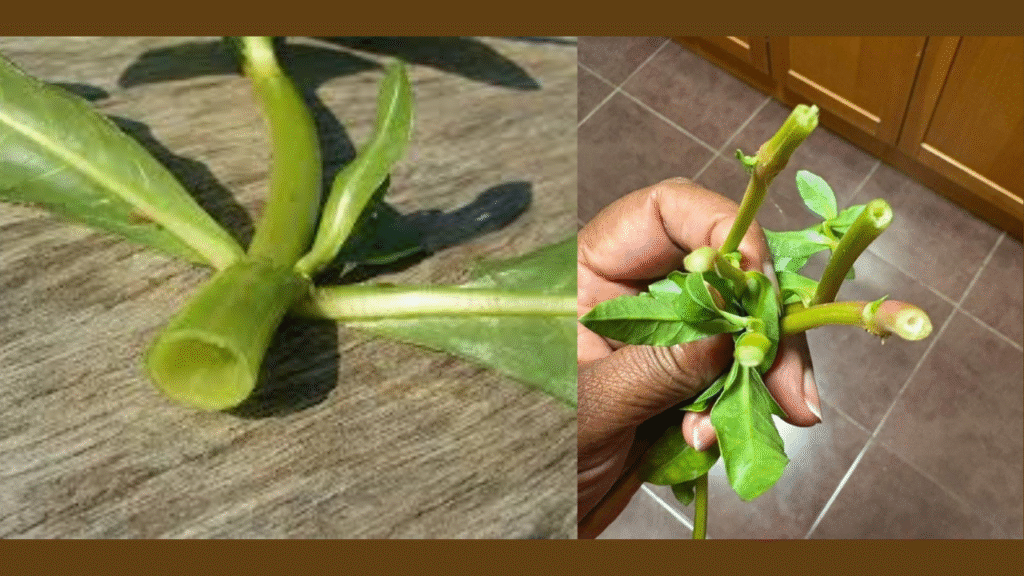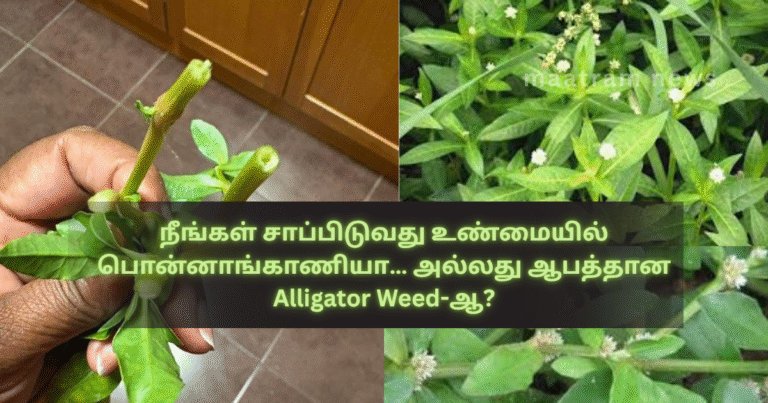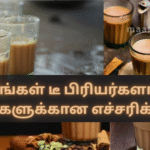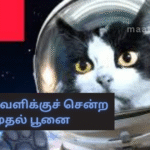இன்றைய காலத்தில் இயற்கை உணவுகளுக்கும் மூலிகைகளுக்கும் Are You Really Eating Ponnanganni… or the Dangerous Alligator Weed? பெரும் வரவேற்பு உள்ளது. அதில் ஒன்று பொன்னாங்காணி (Alternanthera sessilis) — நம் பாரம்பரியத்தில் சத்துமிக்க பயிராக போற்றப்படும் ஒரு செடி. ஆனால் அதே போல் தோற்றமுடைய, ஆபத்தான ஒரு போலி செடி — Alligator Weed (Alternanthera philoxeroides) — நம் தோட்டங்களிலும், வயல்களிலும் பரவிவருகிறது.
பலரும் இதை பொன்னாங்காணி என்று தவறாக நினைத்து சாப்பிடுகின்றனர். ஆனால் நிபுணர்கள் எச்சரிக்கின்றனர் — இது உடல்நலத்துக்கு தீங்கு விளைவிக்கும் ஒரு தவறாக முடிந்துவிடலாம்!
🌿 பொன்னாங்காணி vs Alligator Weed — தோற்றத்தில் ஒரே மாதிரி, விளைவில் வித்தியாசம்
இரண்டு செடிகளும் பச்சை நிறம், சிறிய இலைகள், மற்றும் தண்டில் வெள்ளைப் பூக்கள் என ஒரே மாதிரியாகத் தோன்றும். அதனால் பலர் குழப்பமடைகின்றனர்.
ஆனால் உண்மையில் இவை முழுமையாக வேறு வகைச் செடிகள்.
பொன்னாங்காணி – நம் பாரம்பரிய மருத்துவத்திலும், சித்த மற்றும் ஆயுர்வேதத்திலும் பெரிதும் பயன்படுத்தப்படும் ஒரு மூலிகை. கண்ணுக்கு நல்லது, உடல் சூட்டை தணிக்கும், மற்றும் இரத்தத்தை சுத்தப்படுத்தும் என்று கூறப்படுகிறது.
Alligator Weed – ஒரு வெளிநாட்டு ஊடுருவி தாவரம். இது உணவுக்காக அல்ல. நீர் மற்றும் நிலம் மாசுபடுவதற்கும், மண் நீர்மட்டம் பாதிக்கப்படுவதற்கும் காரணமாகிறது.
☠️ Alligator Weed சாப்பிடுவதால் ஏற்படும் ஆபத்துகள்
Alligator Weed நஞ்சாக இல்லாவிட்டாலும், இது உடல்நலத்துக்கு தீங்கு விளைவிக்கக்கூடிய கூறுகளை கொண்டுள்ளது.
இதில் Heavy Metals (எடையுள்ள உலோகங்கள்) இருப்பதாக ஆய்வுகள் தெரிவிக்கின்றன.
இந்த உலோகங்கள் நீண்டகாலம் உடலில் சேர்வதால், கல்லீரல், சிறுநீரகம், நரம்பு மண்டலம் போன்ற முக்கிய உறுப்பு செயல்பாடுகள் பாதிக்கப்படலாம்.
மேலும், இது நீரில் வேகமாகப் பரவி நிலத்தடி நீர் குழாய்கள், sewerage குழாய்களை அடைக்கும் ஆபத்தும் உண்டு.
ஆஸ்திரேலியா போன்ற நாடுகளில் இது ஒரு முக்கிய சுற்றுச்சூழல் பிரச்சனை ஆகும். அங்குள்ள அரசு இதை அழிக்க பல நடவடிக்கைகள் எடுத்துள்ளது. இருந்தாலும், இந்தியா மற்றும் இலங்கையில் சிலர் இதை இன்னும் பொன்னாங்காணி என நினைத்து வளர்த்து வருகிறார்கள்.
🔍 இரண்டையும் வேறுபடுத்தி அறியும் எளிய வழிகள்
1️⃣ தண்டை முறித்துப் பாருங்கள்:
பொன்னாங்காணி தண்டில் நடுவே ஓட்டை இல்லை.
Alligator Weed தண்டில் குழாய் போல ஓட்டை இருக்கும்.
2️⃣ பூவை கவனிக்கவும்:
பொன்னாங்காணி – ஒவ்வொரு கணுவிலும் (இலை இணையும் இடம்) சிறிய வெள்ளைப் பூக்கள் இருக்கும்.
Alligator Weed – தண்டின் நுனியில் மட்டும் வெள்ளைப் பூக்கள் இருக்கும்.
📸 (இரண்டின் படங்களை ஒப்பிட்டு பார்க்கும் போது இந்த வித்தியாசம் தெளிவாகக் காணலாம்.)

⚡ உங்கள் தோட்டத்தில் Alligator Weed இருந்தால் என்ன செய்யலாம்?
இதை உடனடியாக அழித்து விட வேண்டும்.
வேர்கள் மிகவும் ஆழமாக வளர்ந்திருக்கும் — எனவே கைமுறையாகவே (uprooting) அகற்றுவது சிறந்தது.
இதை எரியவோ, குப்பையில் வீசவோ கூடாது; இதன் சிறு துண்டுகளும் மீண்டும் முளைக்கும்.
புது செடிகள் வளராமல் தடுக்கும் வகையில் நிலப்பரப்பை உலர வைக்கவும்.
🌱 முடிவாக
பொன்னாங்காணி — நம் உடலுக்குப் பயனுள்ள மூலிகை.
Alligator Weed — நம் உடலுக்கும் சுற்றுச்சூழலுக்கும் ஆபத்தான களை.
அதனால், தோற்றம் ஒன்றாக இருந்தாலும், தோட்டத்தில் வளர்வதையும், சாப்பிடுவதையும் முன் இனம்கண்டு உறுதி செய்யுங்கள்.
உங்கள் ஆரோக்கியத்தையும் சுற்றுச்சூழலையும் பாதுகாக்கும் ஒரு சிறிய விழிப்புணர்வு நடவடிக்கை இது! 🌿💚
மேலதிக தகவல்களுக்கு மாற்றம் செய்திகள் இணையத்தளத்தினுள் பிரவேசியுங்கள்.
மேலதிக தகவல்களை உடனுக்குடன் பெற்றுக்கொள்ள மாற்றம் செய்திகள் முகநூல் பக்கத்தை பின்தொடரவும்.
Are You Really Eating Ponnanganni… or the Dangerous Alligator Weed?
In today’s world, natural foods and herbal greens are gaining huge popularity. One such traditional green is Ponnanganni (Alternanthera sessilis) — a highly nutritious plant cherished in traditional Tamil medicine and Ayurveda.
However, there’s another plant that looks almost identical — the Alligator Weed (Alternanthera philoxeroides) — which is rapidly spreading across gardens and fields.
Many people mistake it for Ponnanganni and consume it. But experts warn — this mistake could have serious health consequences!
🌿 Ponnanganni vs Alligator Weed — Similar Appearance, Different Effects
Both plants share a similar look — green leaves, small size, and white flowers on the stem — which causes confusion.
But in reality, they are two completely different species.
- Ponnanganni: A beneficial herb widely used in Siddha and Ayurvedic medicine. It’s believed to improve eyesight, cool the body, and purify the blood.
- Alligator Weed: An invasive foreign plant that is not meant for consumption. It contaminates soil and water and disrupts groundwater balance.
☠️ Health Risks of Eating Alligator Weed
Although Alligator Weed is not classified as a poisonous plant, it contains substances that can be harmful to your health.
- Studies show it absorbs heavy metals from the soil.
- Over time, these metals can accumulate in the body and damage vital organs like the liver, kidneys, and nervous system.
- It also spreads aggressively in water bodies, clogging underground water and sewage pipelines.
Countries like Australia consider this plant a major environmental threat and have taken steps to eradicate it.
Still, in India and Sri Lanka, some people continue to grow it unknowingly, thinking it is Ponnanganni.
🔍 How to Tell Them Apart — Simple Identification Tips
1️⃣ Break the stem:
- Ponnanganni — The stem is solid, with no hollow center.
- Alligator Weed — The stem has a hollow tube-like space inside.
2️⃣ Observe the flowers:
- Ponnanganni — Has tiny white flowers growing at each node (where the leaves join).
- Alligator Weed — Has white flowers only at the tip of the stem.
📸 (If you compare both plants side by side, the difference becomes quite obvious.)
⚡ What to Do If You Find Alligator Weed in Your Garden
- Remove it immediately.
- Its roots grow deep into the soil, so uproot it manually to ensure complete removal.
- Do not burn or throw it away, as even small fragments can regrow.
- Keep the area dry and clean to prevent regrowth.
🌱 In Conclusion
- Ponnanganni — A nutritious and health-boosting herbal green.
- Alligator Weed — A harmful, invasive weed that threatens both health and the environment.
Though they may look similar, make sure to identify the plant correctly before growing or eating it.
A small act of awareness can protect your health, home, and environment! 🌿💚



